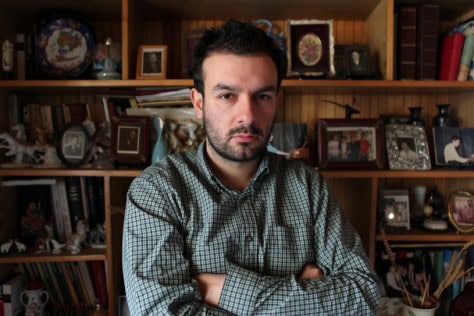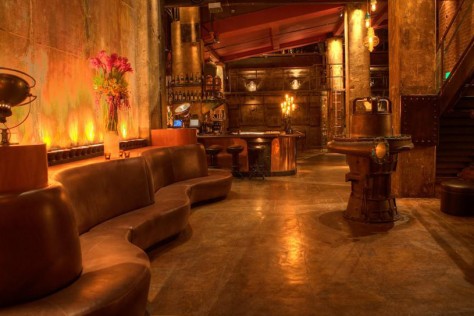One of the most significant and influential post-punk bands to come out of Scotland, Orange Juice, recently shacked up with Domino Recording Co. to put together a truly massive retrospective box set, which perfectly documents the band's entire history. The six-disc, 124-track Coals To Newcastle, which can be purchased for $60 from Domino USA's Web site, includes the group's complete discography, a pretty comprehensive collective of their BBC sessions, and plenty of video footage on the supplemental DVD.
To celebrate the release, Anthem chatted with drummer Steven Daly―who played in the original lineup from 1979 1982 (and alongside frontman Edwyn Collins before Orange Juice even came to be)―about the band's history, the origins of Coals, how they crafted songs, and just what the heck “coals to Newcastle” means.
I guess we should start with the easy one: Orange Juice was formed over 30 years ago… why put together this massive retrospective now?
I was in the original line-up of Orange Juice, along with Edwyn Collins, James Kirk and a bass-player who was replaced before we made our first single. That original line-up was initially known as the Nu-Sonics, named after a cheap old Burns guitar that James used to play. I actually started out as the band’s singer, with Edwyn and James writing the songs. There were so few like-minded musicians in Glasgow that I took up the drums out of necessity, initially using people like Mo Tucker and (Siouxsie and the Banshees’ original drummer) Kenny Morris as role models. (Bitchy rock-snob footnote: at the Nu-sonics debut gig in 1977 or ’78, we did a version of “Love Is All Around,” the theme-song from The Mary Tyler Moore Show. The show was set in Minneapolis, home town of Husker Dü, who had the brilliant idea of covering the very same song—in the mid 1980s.) As far as the timing of the Orange Juice retrospective goes, your guess is as good as mine!
Your sound has been a reference point for countless bands and genres since the 80s. What do you think makes it still relevant today? What did you guys introduce to pop music?
That’s a tricky one, because a lot of our early music was an attempt to combine a preposterously large range of (frequently incompatible) influences. I guess it was Orange Juice’s overall aesthetic that struck a nerve with a lot of people: firstly, we looked like we actually belonged together in a band―which is more important than most people realize—and we were quite kawaii, as the Japanese say. (OK―cute.) The packaging of the early singles showed that we knew exactly what we were doing, and were committed to following it through in meticulous detail. All modesty aside, our fans were generally a fairly hip group of people, and I think they understood/appreciated the messages we were sending out. Since things moved so much slower then, it took a while before we realized that people were actually “hearing the dog whistles.” When we first played in places like Liverpool and Manchester we were genuinely astonished at the extent to which the audience had embraced every aspect of the band. Having said all that, I think that it was Edwyn himself who was largely responsible for what we brought to pop music; the element that has continued to resonate across the decades. His persona—if you will–was entirely natural and sui generis, owing very little to any other front-man I can think of. And he was able to back that up with a fairly precocious level of songwriting ability; it’s still hard to believe that a lad of 19 or 20 wrote some of those lyrics.
What does The Sound Of Scotland mean to you? To me, it always seemed a sort of romantic or cute way to stick a handful of groups from the 70s and 80s into one overarching group. Did you―and do you still―see parallels between Orange Juice and folks like Aztec Camera, Josef K, and other Postcard outfits?
I actually came up with that phrase, as a throwaway, tongue-in-cheek slogan for one of the Postcard singles (“Poor Old Soul”?) To be honest, we weren’t huge fans of the other Postcard bands, although we liked them as individuals; the only group that really impressed us at the time was probably the Fire Engines, from Edinburgh. We had very little in common with them musically, but we most definitely recognized them as kindred spirits and dug their attitude. Still, we did appreciate that Josef K and Aztec Camera, plus with a small handful of other Scottish bands, were just as committed to their own visions―and to ditching trad-rock values―as we were. I don’t know, I guess there was something in the air.
I think it's interesting how the Japanese picked up on (and, let's be honest, copied) your sound in the late 80s… almost before anyone else started aping the style. What do you think it was that led to you and others of your genre and era become idolized by acts like Flipper's Guitar
I can’t really speak for anyone else from that ancient era, but Orange Juice had such a distinctive sound and look that copying our most obvious elements wouldn’t have presented any great challenge to any “neurotic boy outsiders” with the inclination to do so. In fact, if you gave me $2,000 and four boys who looked decent together and could play a bit it would take about two weeks to get them looking and sounding good enough to become the latest “indie-rockers” to get a deal with a major label.
Seriously, though, going back to the songs—they still stand up today, even if some of the recordings don’t do them justice. Nowadays when I listen back to records made by bands that were broadly regarded as part of our (post-punk) peer group, a lot of them sound like unmusical period pieces. Even at the time we’d use the term “ideas-rock” to describe bands who never had a chance of measuring up to their own high-impact conceptualism and paradigm-smashing manifestos. Hey, I didn’t say we were nice people.
“Coals To Newcastle”―what's that mean and how'd you select it as the title for this compilation?
I’ll have to “take a Pasadena on that one.” Except to explain that the British phrase “taking coals to Newcastle” would be the U.S. equivalent of… “taking oil to Texas”?
One of the most special things about you is the fact that you sort of acted against the punk movement of the late-70s. There's an innocence to Orange Juice (the name alone says it all!), and a romanticism that is endlessly infectious, compelling. How did you come to occupy this space within pop?
I think we always managed to be highly self-aware without ever becoming self-conscious. James, Edwyn, Alan Horne and myself were avid readers of the music press, and set our watches by the brightest music writers of the time. (I’m talking about people like Julie Burchill, Danny Baker and—even though he was an ex-hippie―Charles Shaar Murray.) We had all been fully committed (that word again) to the ideals of punk, and by late 1977 we saw bands running out of ideas, and often shamelessly returning to the kind of legs-apart trad-rock we’d supposedly set out to destroy. Fortunately there a new generation took up the flag, bands like the Prefects, the Fall, Wire, the Banshees, PiL und so weiter; unfortunately it became apparent that the initial adrenaline-rush of post-punk couldn’t last, because there’s only so much you can achieve if writing good tunes isn’t on your agenda. Don’t get me wrong, when we were first learning to play, we’d have been quite happy to be part of that scene, but thankfully we were too young and Glasgow was too far off the record companies’ radar. By the time we had finally figured out how musical instruments actually worked, circa 1979, we were seeing the emergence of the farcical scene that would come to be known as Goth scene—so it just seemed obvious that the only thing to do in musical terms was to shed the last remnants of any punk influence and find inspiration in some of the pre-punk sounds we still loved; along with some of the black music coming out of America at the time. There was no question of trying to emulate any of that stuff, of course, because we still couldn’t play all that well, and wanted to somehow stay true to the original ideals of punk. Keep on moving don’t stop.
With time, you sort of fleshed out your sound, made it clear, more muscled. Was this just a result of getting tighter and learning your instruments more and more or did you actively seek to change the band's aesthetic in some way?
I’m not sure which records you’re referring to here. On the first Polydor album we were becoming more assured as players; unfortunately the record’s producer Adam Kidron (whom we chose) was a career-minded cat who grasped the opportunity to burnish his show-reel by recording horn sections and string sections at Polydor’s expense. It was Kidron who lobbied Edwyn to cover the Al Green song, an idea that I opposed to the very last minute. I refused to learn the tune, so we ended up playing along to the original record in the studio. A ludicrous state of affairs, and an extreme example of what can happen when musicians lose their resolve and abandon their core strengths. In this case, we should have stuck to our guns and concentrated on making the best possible records within our original genre. To me, tracks like “Consolation Prize” and “My Dying Day” were examples of Orange Juice moving in a direction that would have maintained our integrity while bringing in more fans. But that all ended abruptly when I refused to go along with firing James Kirk from the band and got fired along with him.
What are you up to these days?
I’ve been a contributing editor at Vanity Fair since 2000.
Any plans to reform?
No. These kind of reunions are desperate exercises in taking money from people who are either too young or stupid to have been into bands at the right time. Plus, Edwyn is still going from strength to strength as a solo artist.
So there you have it.
 Q&A with Larry Gus
Q&A with Larry Gus We Own the Night: The Edison
We Own the Night: The Edison
No Comments